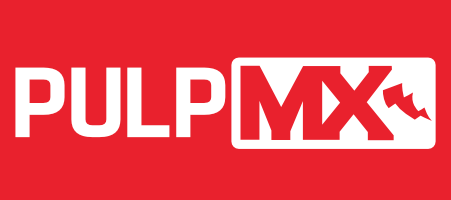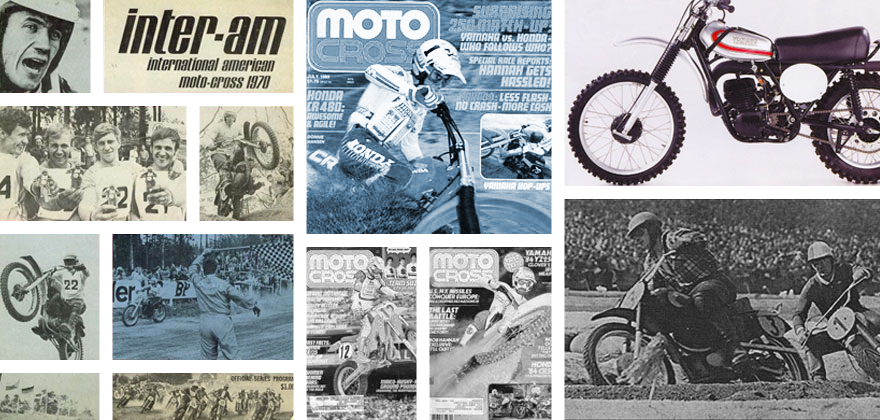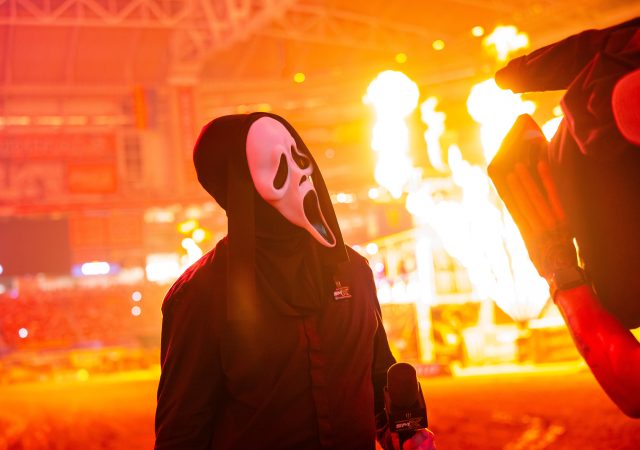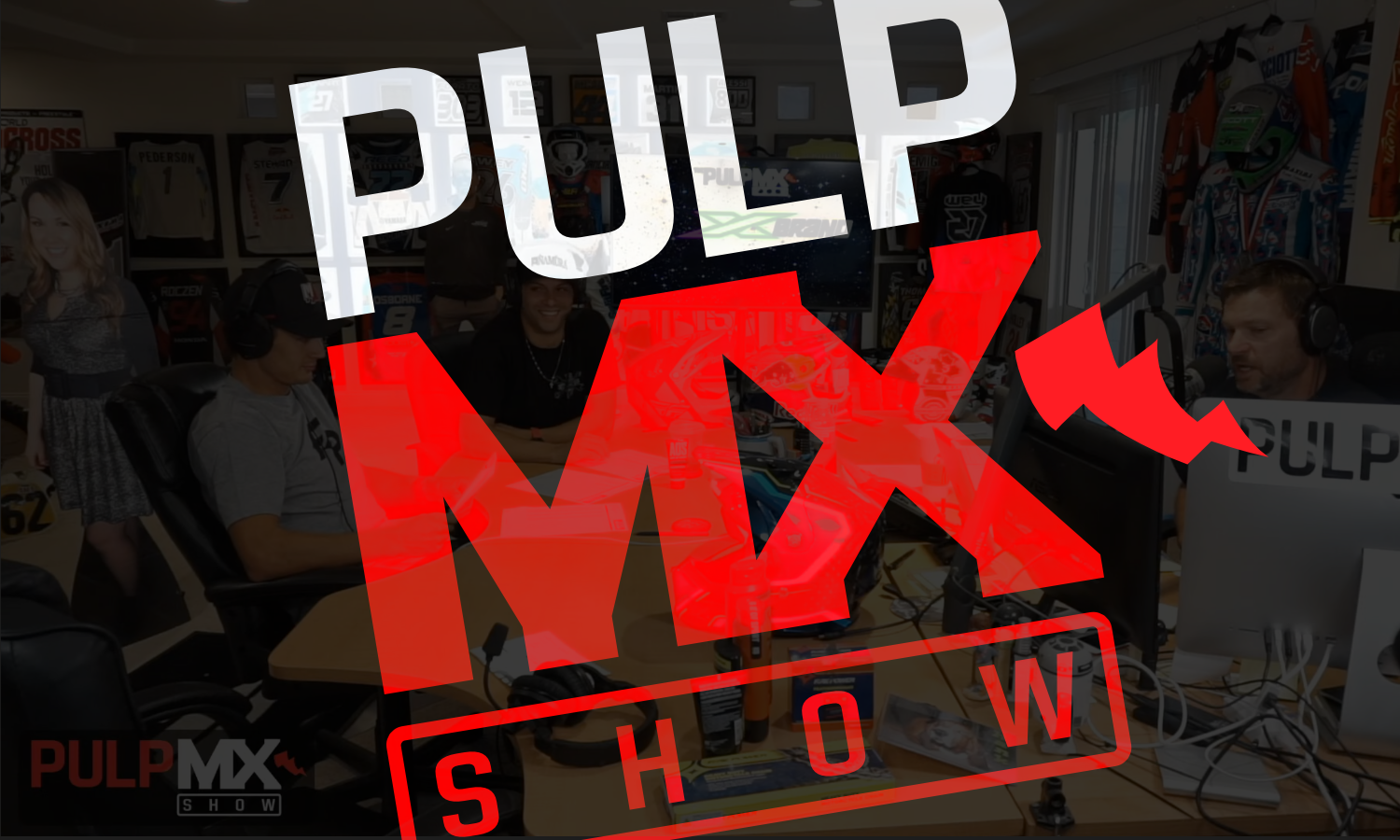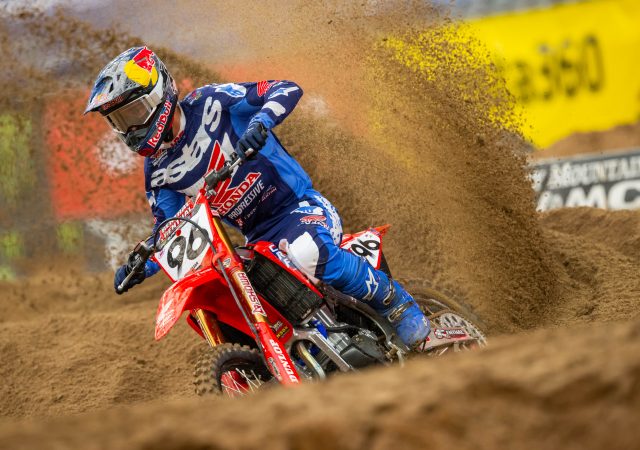
For this edition of Classic Ink, we are going to take a look back at the ads from Jeremy McGrath’s awesome 1998 comeback season.
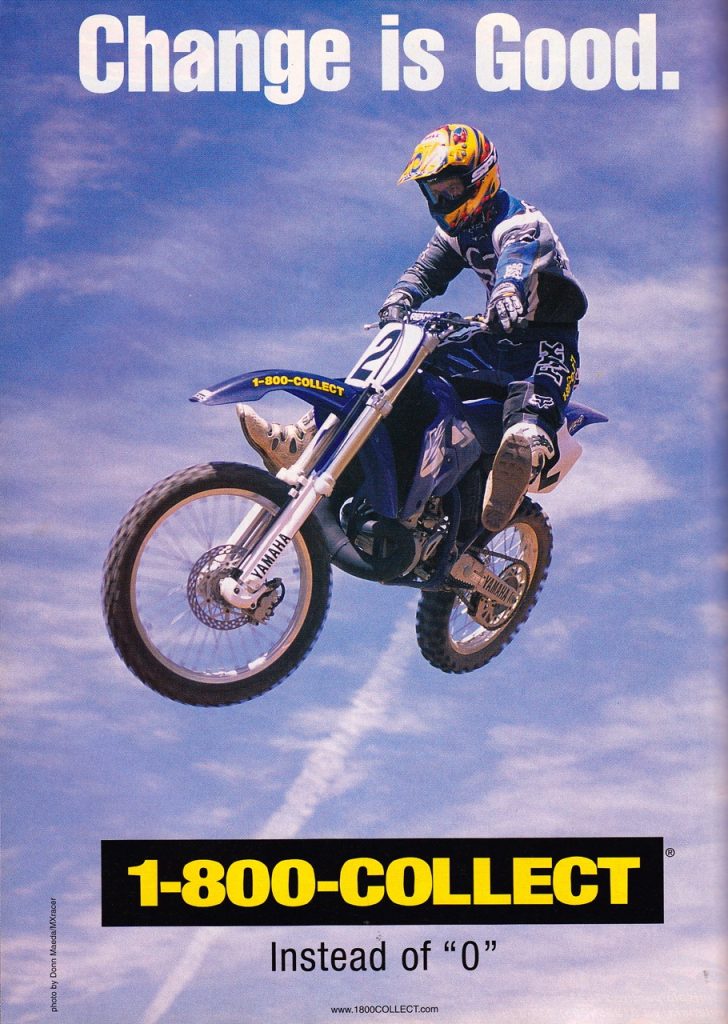 McGrath’s move to blue was big news in 1998. 1-800-COLLECT had been a major sponsor of the Honda team when Jeremy was riding red and they continued to support him in his moves to Suzuki and eventually, Yamaha. Photo Credit: Don Maeda
McGrath’s move to blue was big news in 1998. 1-800-COLLECT had been a major sponsor of the Honda team when Jeremy was riding red and they continued to support him in his moves to Suzuki and eventually, Yamaha. Photo Credit: Don Maeda
In the 1990s no rider was as dominant as Jeremy McGrath. After taking the 250 Supercross class by storm in 1993 with a record-setting 10 victories, the kid they called “Showtime” backed it up with three more years of dominance in 1994, 1995, and 1996. In 1996, McGrath was so unbeatable that he nearly swept the entire Supercross series, winning every round but one where he claimed a very close second to Kawasaki’s Jeff Emig. In 1995, he even backed up his indoor prowess with a critic-silencing victory of the 250 National Motocross Championship. Jeremy McGrath and Honda were all but unstoppable in this era – the very definition of domination on the track.
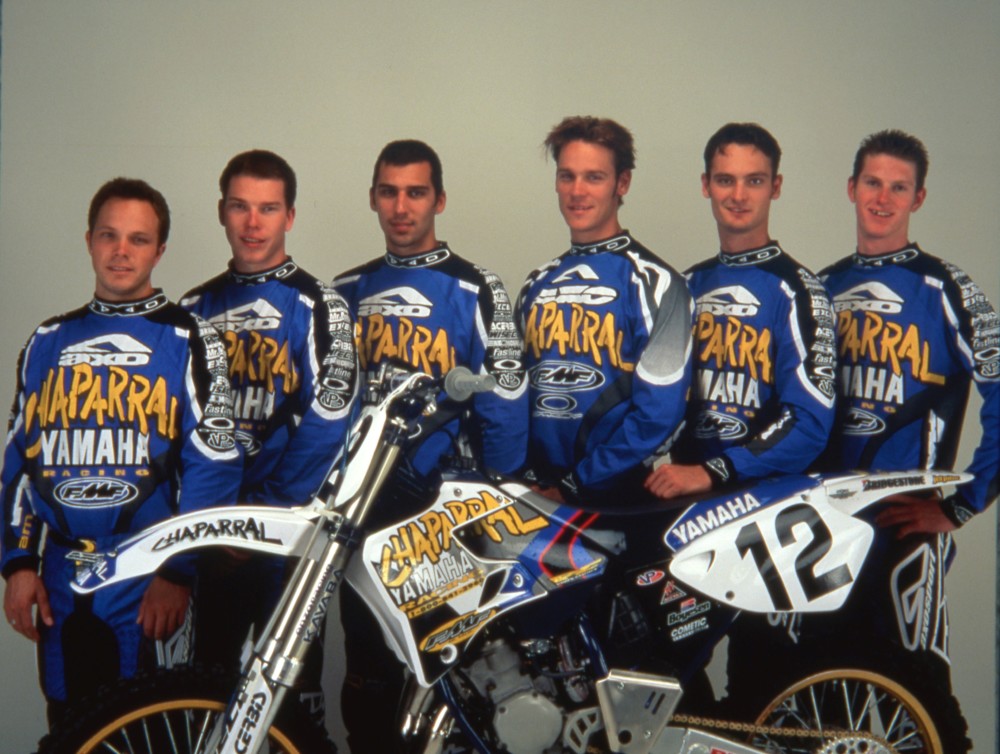
Chaparral had fielded a team in 1996 and 1997, but only Jimmy Button would remain with the paired-down all-blue version of the squad in 1998. Photo Credit: Chapparal Motorsports
In the winter of 1996, however, this narrative took an unexpected twist with the news that McGrath and Honda had come to an impasse in contract talks and the five-time AMA champ was not going to re-sign for the 1997 season. At the time, this was an incredible shock with Honda being responsible for the last nine Supercross titles in a row. Rick Johnson, Jeff Stanton, Jean-Michel Bayle, and Jeremy McGrath had made Big Red an impenetrable wall of Supercross supremacy and the thought of a top rider leaving Honda with the number one plate was virtually unimaginable.
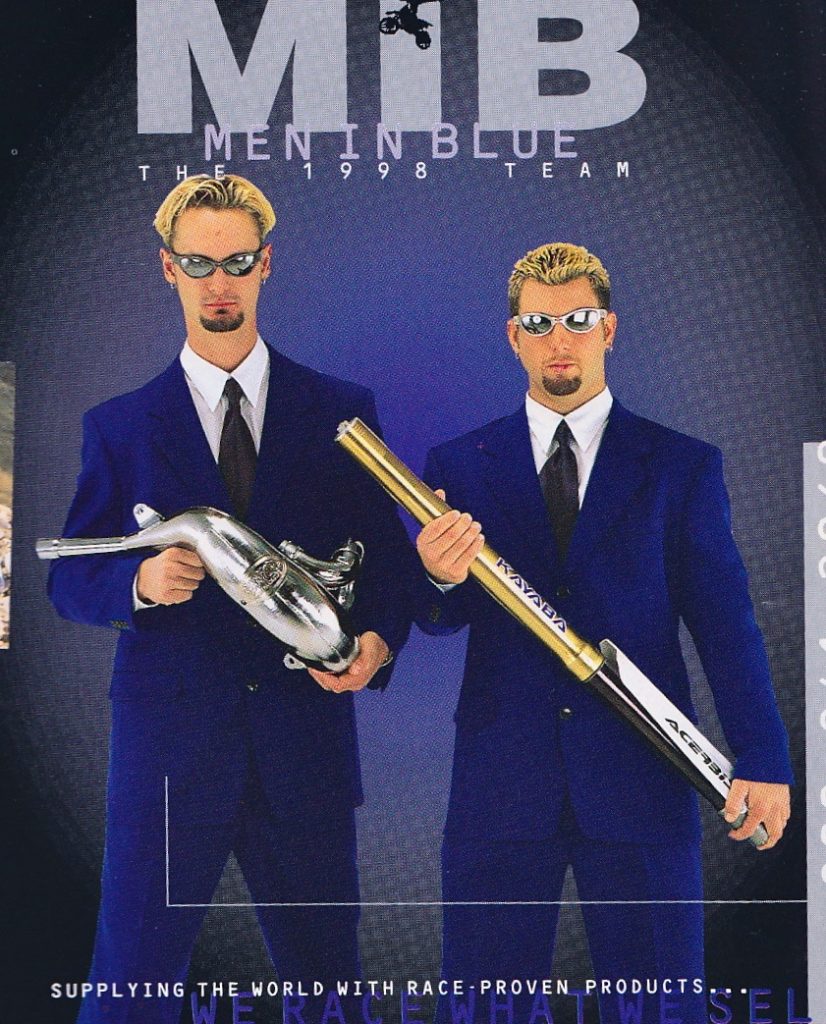 Chaparral’s new Men In Blue campaign was a clever play on the popular Will Smith sci-fi film Men In Black which had been a big hit in 1997. Photo Credit: Chaparral Motorsports
Chaparral’s new Men In Blue campaign was a clever play on the popular Will Smith sci-fi film Men In Black which had been a big hit in 1997. Photo Credit: Chaparral Motorsports
Perhaps most shocking was the timing of McGrath’s departure. Most rider negotiations took place over the summer, so each party had time to plan, test, and get ready for the new season in January. In the case of McGrath’s parting, it was well into the offseason when all the teams, budgets, and logistics were already set. McGrath’s last-minute divorce left the sport’s winningest rider without a ride and a paddock full of suiters without the budget, bikes, or testing time needed to back a championship run for number one.
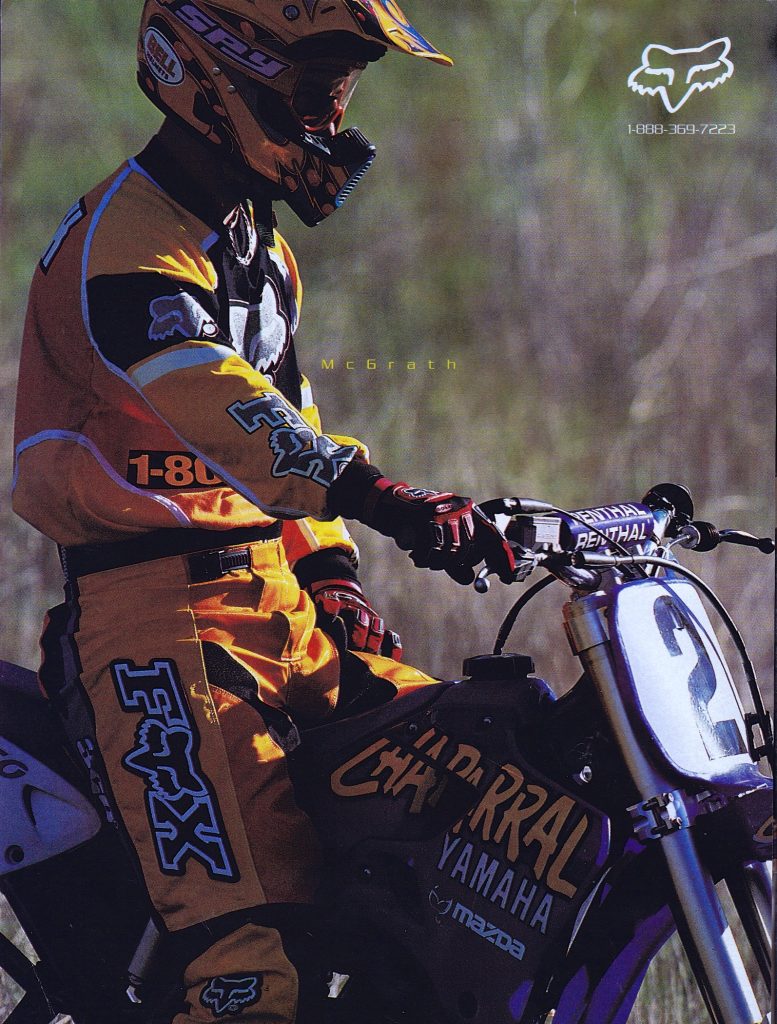 Like 1-800-Collect, Fox Racing made the jump to Suzuki and Yamaha with McGrath. Photo Credit: Fox Racing
Like 1-800-Collect, Fox Racing made the jump to Suzuki and Yamaha with McGrath. Photo Credit: Fox Racing
At the last minute, Showtime’s old Honda mentor Roger De Coster came to the rescue with a new partner – Phil Alderton of Troy Racing. The two partnered to give McGrath a ride under the newly formed Suzuki of Troy Racing team with Ryan Hughes’ old Pro Circuit mechanic Wyatt Seals as his tuner. While the Suzuki of Troy team would make the season opener in Los Angeles, McGrath’s lack of preparation and unfamiliarity with the machine would become readily apparent. A fifteenth in the season opener marked McGrath’s worst finish since moving full-time to the 250 class in 1993. McGrath would rebound for a podium at round two, but it would take him until round eleven to finally capture a victory on his Suzuki of Troy RM. A myriad of issues including a Honda-sourced throttle that did not open fully, multiple clutch problems (reportedly due to Wyatt Seals installing it improperly), and a flat in Charlotte would derail Jeremy’s attempt at a fifth straight Supercross title. Skip Norfolk, McGrath’s longtime Honda mechanic, would eventually be pulled out of retirement to replace Wyatt Seals, but by that point, the relationship between Suzuki and McGrath was irreparably damaged.
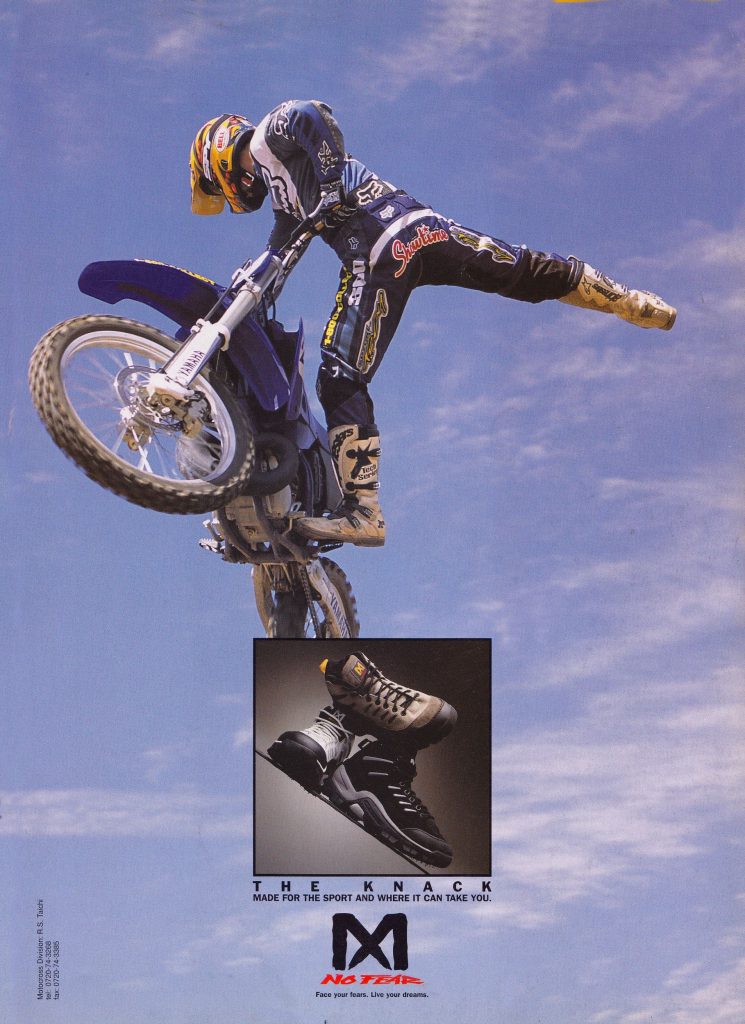 In 1998, No Fear was still a lifestyle brand best known for the stickers that adorned the rear windows of most motocross racer’s trucks. A year later, their transition to riding gear would cause a huge splash and deeply contentious split between McGrath and long-time sponsor Fox Racing. As an interesting side note, check out McGrath’s gear which still features the Suzuki of Troy logo on his pants. Photo Credit: No Fear
In 1998, No Fear was still a lifestyle brand best known for the stickers that adorned the rear windows of most motocross racer’s trucks. A year later, their transition to riding gear would cause a huge splash and deeply contentious split between McGrath and long-time sponsor Fox Racing. As an interesting side note, check out McGrath’s gear which still features the Suzuki of Troy logo on his pants. Photo Credit: No Fear
At the end of the 1997 season, McGrath was looking for a fresh start and once again it was a private team that provided that opportunity. This time, it was Dave Damron and his powerhouse aftermarket empire of Chapparal to the rescue. Like Alderton, Damron had already established a race team before the arrival of McGrath, but his Chapparal squad was not thought of as a title contender. Chapparal’s 1996 and 1997 teams were a hodgepodge of former factory riders looking for a second or third shot at stardom, and inexperienced young talent. With the arrival of McGrath, the Chaparral’s rider lineup was trimmed significantly for 1998. The only rider to return from the 1997 Chapparal team was McGrath’s long-time friend Jimmy Button. This left Chad Pederson, Greg Schnell, Michael Brandes, Phil Lawrence, and Travis Preston looking for new rides for 1998.
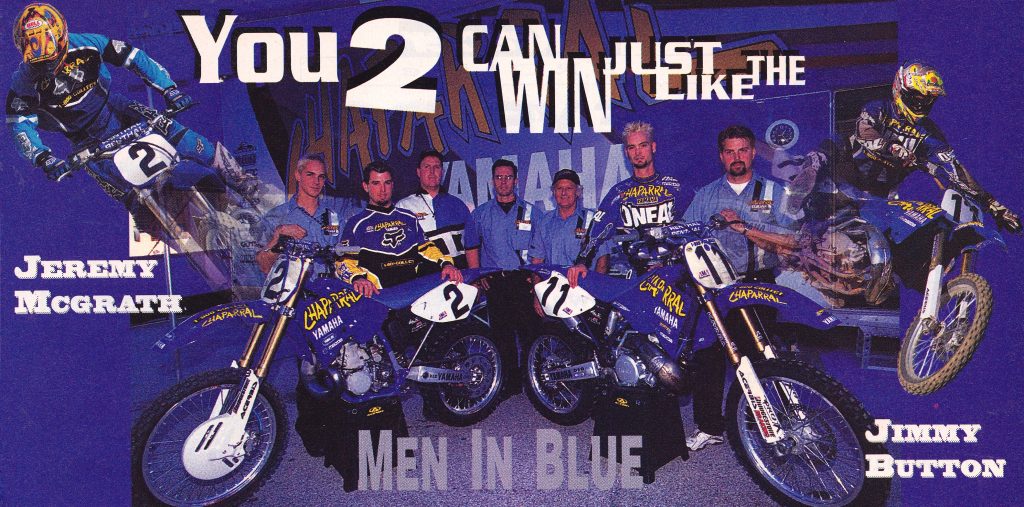 With Yamaha’s factory involvement the Chaparral team adopted the blue team’s corporate colors and a far more understated graphics package for 1998. Photo Credit: Chaparral Motorsports
With Yamaha’s factory involvement the Chaparral team adopted the blue team’s corporate colors and a far more understated graphics package for 1998. Photo Credit: Chaparral Motorsports
With the hiring of McGrath, the Chapparal team’s profile was upgraded exponentially. Damron and team manager (and former Chaparral rider) Larry Brooks negotiated factory support from Yamaha for the former champ and selected Randy Lawrence to be his tuner. As in 1997, Button would remain on a production-based YZ250. At the time, the YZ250 was not yet considered to be the dominant machine in the class, but it was generally regarded as a much better starting point for a race team than Suzuki’s RM250. With full factory support and much more time to prepare, McGrath and Chapparal went into 1998 in a far better position than Showtime’s last-minute 1997 campaign. While no one knew for certain if the champ could rekindle the magic he had generated in his Honda days, longtime McGrath fans were hoping for a successful season to wash away the disappointment and discouragement of 1997.
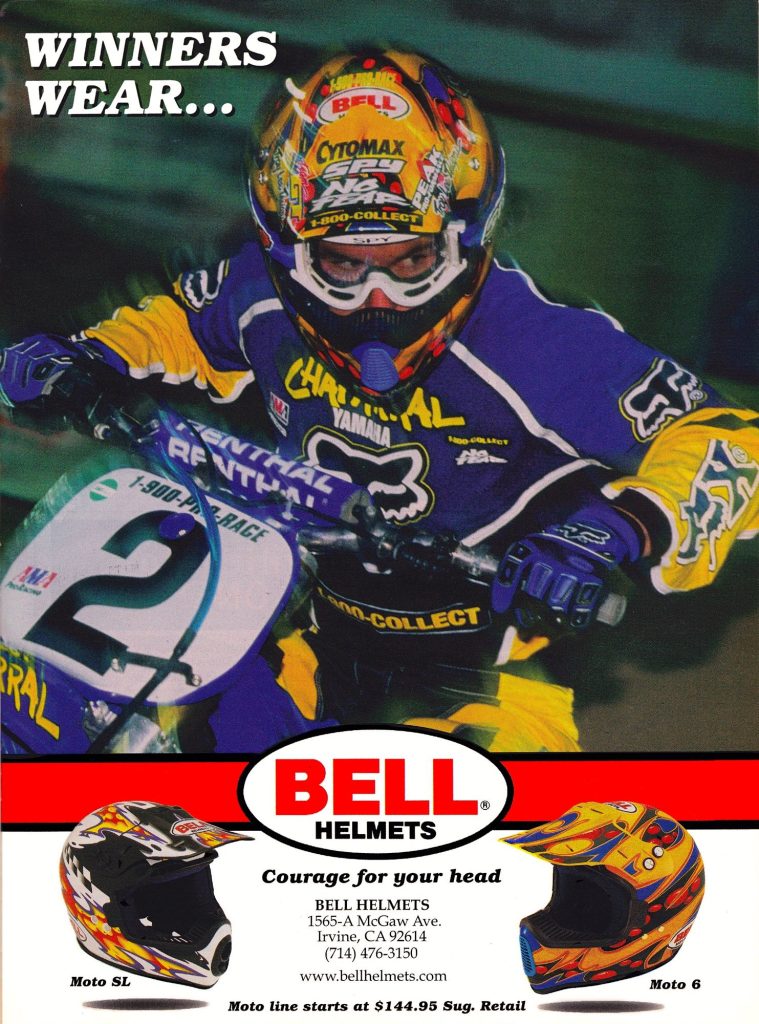 Bell Helmets has been with McGrath since the earliest days of his career and continues to support him to this day. Photo Credit: Bell Helmets
Bell Helmets has been with McGrath since the earliest days of his career and continues to support him to this day. Photo Credit: Bell Helmets
Once again opening in the LA Coliseum, the 1998 Supercross season kicked off with the second surprise upset in as many years. The 1997 opener had seen Greg Albertyn capture a shocking first Supercross win and this time, it was another GP regular in the form of 1996 125 World Motocross champion Sebastien Tortelli scoring the win. 1997 champ Jeff Emig and McGrath rounded out the podium so at least this opener did not deliver MC fans the utter disaster the previous season kickoff had. Second place finishes at round two and three behind Honda’s Ezra Lusk had some wondering if Lusk was finally ready to take the mantle of the sport’s next great champion away from McGrath, but victories at rounds four, five, six, and seven quickly dispelled any notion that McGrath was ready to step aside. In the end, McGrath and his team would claim seven victories on his way to a fifth AMA Supercross championship. Early season scares from Lusk, a mid-season DNF, and a wrist injury from a clamp failure at Pontiac would mean that 1998 was not as drama-free as his Honda seasons, but there could be no doubt that the champ was back.
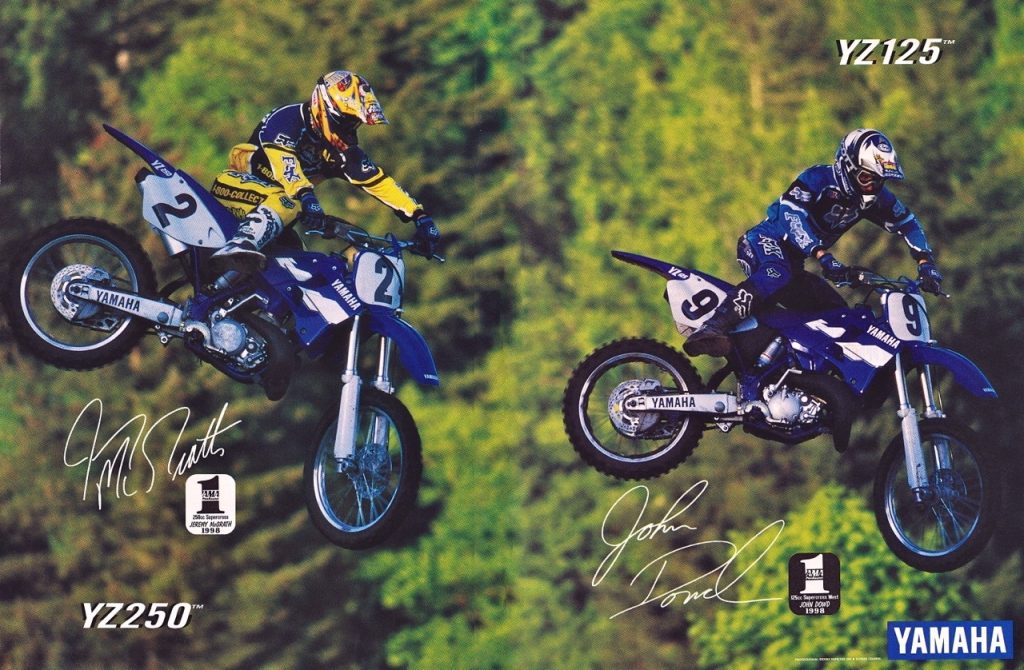 McGrath was joined by John Dowd as a Yamaha supercross champion in 1998. Photo Credit: Yamaha
McGrath was joined by John Dowd as a Yamaha supercross champion in 1998. Photo Credit: Yamaha
Today, many people still associate the greatest Supercross rider of all time with his Honda days, but the second chapter of his career may be even more impressive. Age and increased competition made the later years more of a challenge, but Showtime continued to rack up the wins and vanquish his younger foes. In 2001, Ricky Carmichael finally got the better of the champ, but not before he had racked up seven Supercross titles and 72 total victories. The Chapparal years and 1998 in particular will always be remembered for rekindling a career that looked like it might have run its course in the summer of 1997. Anyone who saw McGrath going through the motions and fading back on his RM in the outdoor Nationals of 1997 would be lying if they told you they knew the return of the old MC was a sure thing. The disillusionment and discontent of 1997 could have easily derailed a historic career, but instead, the King of Supercross wrote an even more epic chapter two.
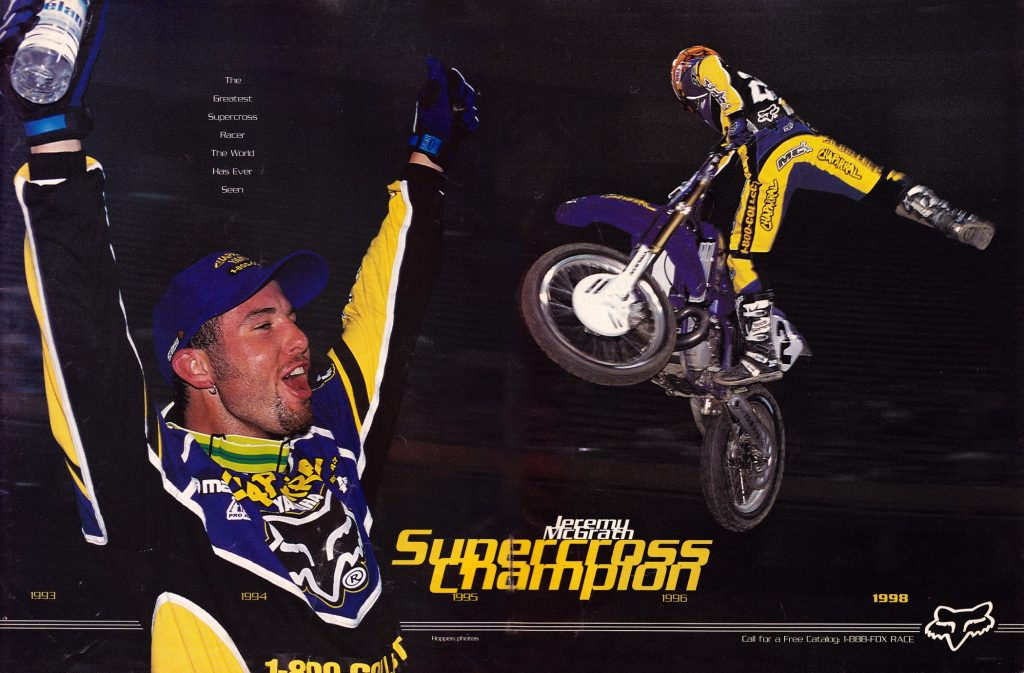 While McGrath’s domination in the nineties did not always allow for the best racing on the track, his popularity and showmanship were never in doubt. Photo Credit: Fox Racing
While McGrath’s domination in the nineties did not always allow for the best racing on the track, his popularity and showmanship were never in doubt. Photo Credit: Fox Racing
